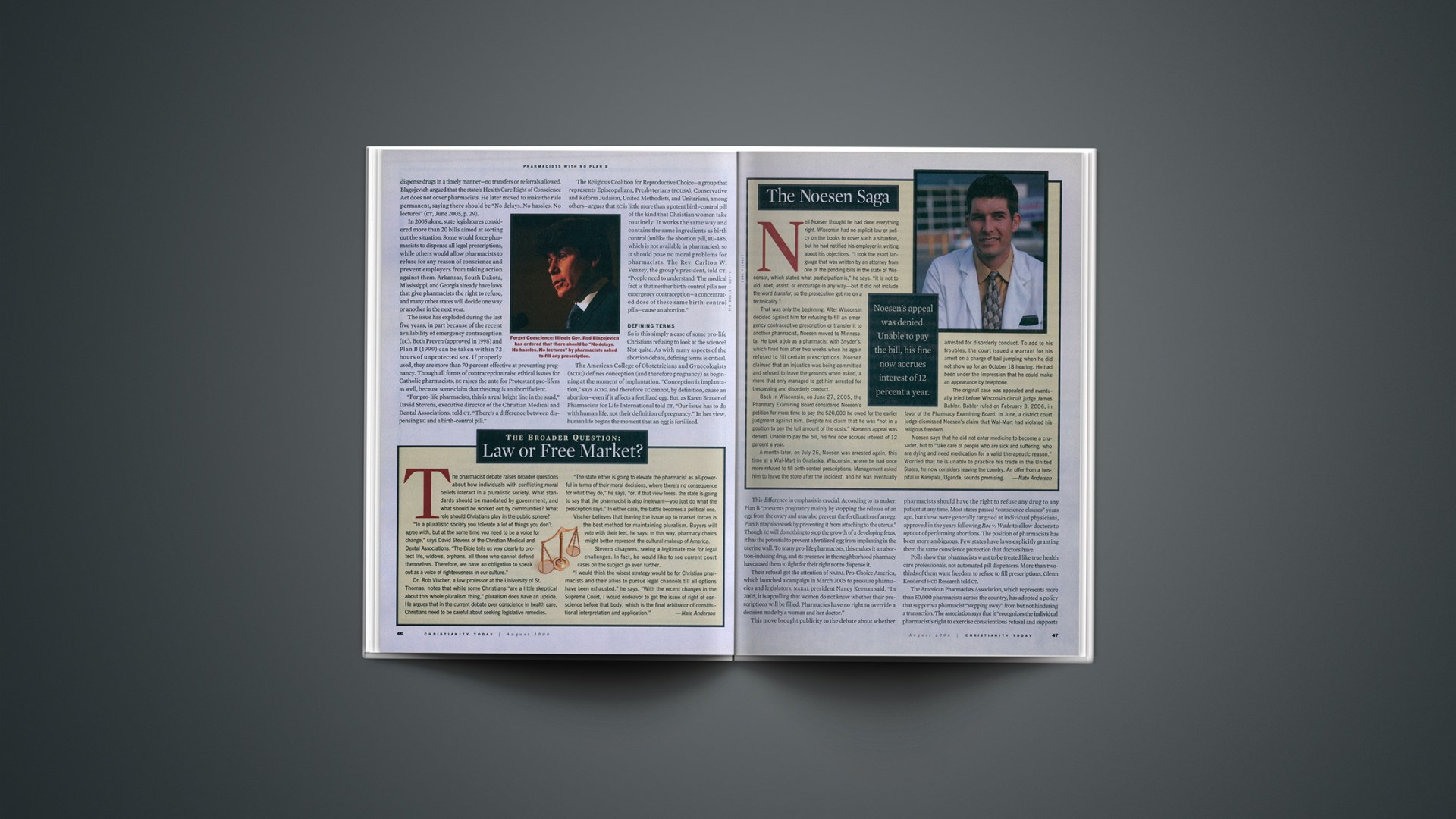Neil Noesen thought he had done everything right. Wisconsin had no explicit law or policy on the books to cover such a situation, but he had notified his employer in writing about his objections. “I took the exact language that was written by an attorney from one of the pending bills in the state of Wisconsin, which stated what participation is,” he says. “It is not to aid, abet, assist, or encourage in any way—but it did not include the word transfer, so the prosecution got me on a technicality.”
That was only the beginning. After Wisconsin decided against him for refusing to fill an emergency contraceptive prescription or transfer it to another pharmacist, Noesen moved to Minnesota. He took a job as a pharmacist with Snyder’s, which fired him after two weeks when he again refused to fill certain prescriptions. Noesen claimed that an injustice was being committed and refused to leave the grounds when asked, a move that only managed to get him arrested for trespassing and disorderly conduct.
Back in Wisconsin, on June 27, 2005, the Pharmacy Examining Board considered Noesen’s petition for more time to pay the $20,000 he owed for the earlier judgment against him. Despite his claim that he was “not in a position to pay the full amount of the costs,” Noesen’s appeal was denied. Unable to pay the bill, his fine now accrues interest of 12 percent a year.
A month later, on July 26, Noesen was arrested again, this time at a Wal-Mart in Onalaska, Wisconsin, where he had once more refused to fill birth-control prescriptions. Management asked him to leave the store after the incident, and he was eventually arrested for disorderly conduct. To add to his troubles, the court issued a warrant for his arrest on a charge of bail jumping when he did not show up for an October 18 hearing. He had been under the impression that he could make an appearance by telephone.
The original case was appealed and eventually tried before Wisconsin circuit judge James Babler. Babler ruled on February 3, 2006, in favor of the Pharmacy Examining Board. In June, a district court judge dismissed Noesen’s claim that Wal-Mart had violated his religious freedom.
Noesen says that he did not enter medicine to become a crusader, but to “take care of people who are sick and suffering, who are dying and need medication for a valid therapeutic reason.” Worried that he is unable to practice his trade in the United States, he now considers leaving the country. An offer from a hospital in Kampala, Uganda, sounds promising.
Copyright © 2006 Christianity Today. Click for reprint information.
Related Elsewhere:
Also posted today is:
Pharmacists with no Plan B | Freedom of conscience and ‘reproductive rights’ clash at the local drugstore.
sidebar
Law or Free Market? | Pursuing morality in a pluralist society.
News elsewhere about pharmacists refusing to fill birth control prescriptions includes:
Pharmacy refusals lead to complaint | Group says women were improperly denied emergency contraception. (Albany Times Union, N.Y., Aug 16, 2006)
Druggists refuse to give out pill | Some pharmacists disagree on moral grounds to fill prescriptions for contraceptives. And states from Rhode Island to Washington have proposed laws that would protect such decisions. (USA Today, Nov. 8, 2004)
Pharmacists’ rights at front of new debate | Because of beliefs, some refuse to fill birth control prescriptions (Washington Post, March 28, 2005)
Ill. pharmacies required to fill prescriptions for birth control | Illinois Gov. Rod R. Blagojevich (D) issued an emergency rule Friday that requires pharmacies to accept and fill prescriptions for contraceptives without delay, after a growing number of complaints nationwide that some pharmacists are refusing to dispense birth control pills and the “morning-after” pill. (Washington Post, April 2, 2005)
Are Pharmacists Right To Choose? | Debate over letting them refuse to provide birth control pills (CBS News, March 29, 2005)
Pharmacists ‘denying birth control’ | The latest religious voice to emerge in US society is that of the pharmacist. (BBC, April 10, 2005)
Other articles on birth control include:
A Hard Pill to Swallow | How the tiny tablet upset my soul. (Nov. 8, 2005)
Other CT articles on reproduction and birth control include:
Has Natural Birth Control Been Proved Impossible? | Don’t believe the media reports, cautions the author of Birth Control for Christians. (July 15, 2003)
Make Love and Babies | The contraceptive mentality says children are something to be avoided. We’re not buying it. (Nov. 9, 2001)
‘Be Fruitful and Multiply’ | Is this a command, or a blessing? By Raymond C. Van Leeuwen (Nov. 9, 2001)
Souls on Ice | The costs of in vitro fertilization are moral and spiritual—not just financial (June 24, 2003)
400K and Counting | Christians recoil at explosive growth of frozen human embryos (June 24, 2003)
Charity Defies California Law on Contraception | Court to decide if state can require Catholic ministries to pay for birth control (June 25, 2002)
Hannah’s Sisters | At a Washington Assembly of God, prayers for fertility are answered (Mar. 21, 2002)
Books & Culture Corner: More Sex, Fewer Children | Mixed messages on condoms, contraception, and fertility. By John Wilson (Sept. 10, 2001)
No Room in the Womb? | Couples with high-risk pregnancies face the ‘selective reduction’ dilemma (dec. 10, 1999)
How to Make a Person | New reproductive technologies raise difficult moral issues. (Jan. 6, 1997)
Mourning the Morning-After Pill | A Christianity Today Editorial (Apr. 7, 1997)










